OK, sigh of relief officially breathed…
 Of all the series I watched in 2016, there’s no question that Girlish Number was the biggest pleasant surprise – the show that most exceeded my expectations. Which is to say none, because this thing was completely off my radar until a bunch of folks urged me to check it out. Forget sleeper, it was more just asleep as far as I was concerned. But GN ended up being a show I really looked forward to every week, and one that continued to surprise me (not always for the better, but mostly) even after I figured out how good it was.
Of all the series I watched in 2016, there’s no question that Girlish Number was the biggest pleasant surprise – the show that most exceeded my expectations. Which is to say none, because this thing was completely off my radar until a bunch of folks urged me to check it out. Forget sleeper, it was more just asleep as far as I was concerned. But GN ended up being a show I really looked forward to every week, and one that continued to surprise me (not always for the better, but mostly) even after I figured out how good it was.
 Let me stipulate for the record that I have and have never had expectations that Girlish Number is going to be popular (Stalker agrees), or that most of the people who do watch it are going to be receptive to what it has to say. Anime fans don’t, as a rule, like to be reminded of what’s wrong with the medium because such reminders are an implicit criticism of them. It’s because the audience is so easily led by the nose that the industry is able to get away with the stuff we see in this series, but people don’t want to hear that. And who can blame them? It’s just entertainment, when push comes to shove.
Let me stipulate for the record that I have and have never had expectations that Girlish Number is going to be popular (Stalker agrees), or that most of the people who do watch it are going to be receptive to what it has to say. Anime fans don’t, as a rule, like to be reminded of what’s wrong with the medium because such reminders are an implicit criticism of them. It’s because the audience is so easily led by the nose that the industry is able to get away with the stuff we see in this series, but people don’t want to hear that. And who can blame them? It’s just entertainment, when push comes to shove.
 Oddly, though, the fact that Girlish Number is clearly the author writing mostly for his own entertainment is the source of much of its charm. This series is much like Majimoji Rurumo in that it’s the “B” series of an author with a massively popular “A” title, and that it got an anime only because of that other series’ commercial influence. Now it’s hard to imagine two writers more different in tone and substance (though not in name – eerily similar) than Watari Wataru and Watanabe Wataru. The latter is upbeat and innocent, and Majimoji Rurumo reflects that beautifully. But Gi(a)rlish just as beautifully reflects Watari’s cynicism and world-weary resignation. The difference is that in his case, it works much more effectively here than in the far more popular title for which he’s mostly known, because the change in setting allows him to at least partially escape from the LN cliches which are (ironically) his stumbling block.
Oddly, though, the fact that Girlish Number is clearly the author writing mostly for his own entertainment is the source of much of its charm. This series is much like Majimoji Rurumo in that it’s the “B” series of an author with a massively popular “A” title, and that it got an anime only because of that other series’ commercial influence. Now it’s hard to imagine two writers more different in tone and substance (though not in name – eerily similar) than Watari Wataru and Watanabe Wataru. The latter is upbeat and innocent, and Majimoji Rurumo reflects that beautifully. But Gi(a)rlish just as beautifully reflects Watari’s cynicism and world-weary resignation. The difference is that in his case, it works much more effectively here than in the far more popular title for which he’s mostly known, because the change in setting allows him to at least partially escape from the LN cliches which are (ironically) his stumbling block.
 My worry, as you know, was that Girlish Number was going to sell out in the end – to give us a feel-good conclusion or redeem Kuzu-P in such a fashion as to betray the spirit of the show. But as you also know I’ve become increasingly confident in recent weeks that wasn’t likely to happen, because Gi(a)rlish has demonstrated that it’s got the balance just right. A satire can’t be all bleakness and despair if it’s going to work narratively, and Watari understands this – and the focus on the human side of the equation has allowed him to give the audience something to feel good about without glossing over the industry issues the series has highlighted. And damn if Chitose – my “false main character” – hasn’t turned out to be a very winning protagonist.
My worry, as you know, was that Girlish Number was going to sell out in the end – to give us a feel-good conclusion or redeem Kuzu-P in such a fashion as to betray the spirit of the show. But as you also know I’ve become increasingly confident in recent weeks that wasn’t likely to happen, because Gi(a)rlish has demonstrated that it’s got the balance just right. A satire can’t be all bleakness and despair if it’s going to work narratively, and Watari understands this – and the focus on the human side of the equation has allowed him to give the audience something to feel good about without glossing over the industry issues the series has highlighted. And damn if Chitose – my “false main character” – hasn’t turned out to be a very winning protagonist.
 I’ll allow that the drama in the finale was a bit forced – yes, Tokyo rarely gets snow and tends to seize up when it does, but the others managed to get to the studio more or less on-time. But thematically I think it works, because we see that even after her pep-talk from Goujou-kun, there’s no miraculous transformation – Chii-sama is still Chii-sama. This is who she is, just like the industry is what it is – she’s slovenly, lazy, a procrastinator and self-obsessed. But in the end she does want to do the right thing, and she does feel a sense of responsibility to the others on “her” team. But I like the fact that it was the “I’ll kill you” from Goujou that finally rousted her into action.
I’ll allow that the drama in the finale was a bit forced – yes, Tokyo rarely gets snow and tends to seize up when it does, but the others managed to get to the studio more or less on-time. But thematically I think it works, because we see that even after her pep-talk from Goujou-kun, there’s no miraculous transformation – Chii-sama is still Chii-sama. This is who she is, just like the industry is what it is – she’s slovenly, lazy, a procrastinator and self-obsessed. But in the end she does want to do the right thing, and she does feel a sense of responsibility to the others on “her” team. But I like the fact that it was the “I’ll kill you” from Goujou that finally rousted her into action.
 That carries over to the recording session itself (there’s a beautiful moment when the disheveled Chitose urges herself to “Act like Chitose!” before she descends the stairs). Chi’s “pep talk” is hilariously jaded – basically, “This show sucks and dammit, the whole industry sucks, and I don’t even understand the material but I like you guys, so let’s do a decent job”. And then Momoka (who may be my favorite female character this season) basically confirms that “KuuSure” is a joke but she, too, kind of likes the project, and everyone gets down to business. And all this is happening right in front of the LN author, mind you.
That carries over to the recording session itself (there’s a beautiful moment when the disheveled Chitose urges herself to “Act like Chitose!” before she descends the stairs). Chi’s “pep talk” is hilariously jaded – basically, “This show sucks and dammit, the whole industry sucks, and I don’t even understand the material but I like you guys, so let’s do a decent job”. And then Momoka (who may be my favorite female character this season) basically confirms that “KuuSure” is a joke but she, too, kind of likes the project, and everyone gets down to business. And all this is happening right in front of the LN author, mind you.
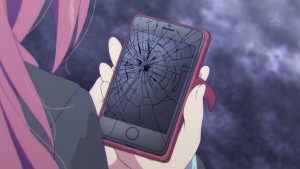 That pretty much sums up the (un)happy medium that Gi(a)rlish Number reaches in the end – today’s anime may suck, but it’s the only anime we have so by God, let’s make the best of it. There are good people here, people who want to do good work and represent the medium they love well, but irrespective of that when one takes a job they have to do their best no matter the circumstances. Let’s be blunt, GN still waters things down a bit – I mean, compared to what animators suffer through seiyuu are on a luxury cruise (if anyone decides to make a series about that situation, I’ll start lining up now to buy the Blu-rays) but even so, it lays the industry bare in a way no other TV anime has really dared to.
That pretty much sums up the (un)happy medium that Gi(a)rlish Number reaches in the end – today’s anime may suck, but it’s the only anime we have so by God, let’s make the best of it. There are good people here, people who want to do good work and represent the medium they love well, but irrespective of that when one takes a job they have to do their best no matter the circumstances. Let’s be blunt, GN still waters things down a bit – I mean, compared to what animators suffer through seiyuu are on a luxury cruise (if anyone decides to make a series about that situation, I’ll start lining up now to buy the Blu-rays) but even so, it lays the industry bare in a way no other TV anime has really dared to.
 I think that’s why Chitose works as a MC in the end. She’s not a great person, but she’s the right fit for the job. Who among us hasn’t said “Let’s make lots of money for easy work!” – at least when we thought no one was listening? Chitose is all about diminished expectations, an irritating and exasperating figure you somehow can’t help but like (which is anime in 2016 pretty much, at least for me). She may not be the protagonist we want, but she’s the on we need (and deserve, ROFL). And she’s very much true to herself, warts and all, which is something I respect. She has a strong desire to be something whether she deserves it or not, and in a perverse way that’s kind of admirable.
I think that’s why Chitose works as a MC in the end. She’s not a great person, but she’s the right fit for the job. Who among us hasn’t said “Let’s make lots of money for easy work!” – at least when we thought no one was listening? Chitose is all about diminished expectations, an irritating and exasperating figure you somehow can’t help but like (which is anime in 2016 pretty much, at least for me). She may not be the protagonist we want, but she’s the on we need (and deserve, ROFL). And she’s very much true to herself, warts and all, which is something I respect. She has a strong desire to be something whether she deserves it or not, and in a perverse way that’s kind of admirable.
 That, in the end, is what maintains the balance in Girlish Number and makes it enjoyable to watch rather than depressing. The cast is excellent, each of the main girls and even the guys having a clearly defined persona by the end. Momoka is one of the best and most trope-defying characters of the year, and the relationship between Chitose and Goujou ends up being one of the more believable and even moving sibling bonds we’ve seen in anime for a while. It never gives itself over to sloppy sentimentalism even in the end, but it’s clear how these two feel about each other (warts and all).
That, in the end, is what maintains the balance in Girlish Number and makes it enjoyable to watch rather than depressing. The cast is excellent, each of the main girls and even the guys having a clearly defined persona by the end. Momoka is one of the best and most trope-defying characters of the year, and the relationship between Chitose and Goujou ends up being one of the more believable and even moving sibling bonds we’ve seen in anime for a while. It never gives itself over to sloppy sentimentalism even in the end, but it’s clear how these two feel about each other (warts and all).
 “Make the best of it” may not be the most inspirational message for a series, and “It’s anime’s fault!” may be the worst way to try and win over an audience. But they work a treat for Girlish Number, which walks a tightrope between cynicism and determined resolve as well as it can be walked. “Kata na. Ga ha ha!” indeed – the conversation in the bar at the end summed up the “KuuSure” (and Girlish Number) experience about as well as it can be. Not everyone can change the world, but everyone has to live in it – and that applies to our little anime corner of it just as much as anywhere else.
“Make the best of it” may not be the most inspirational message for a series, and “It’s anime’s fault!” may be the worst way to try and win over an audience. But they work a treat for Girlish Number, which walks a tightrope between cynicism and determined resolve as well as it can be walked. “Kata na. Ga ha ha!” indeed – the conversation in the bar at the end summed up the “KuuSure” (and Girlish Number) experience about as well as it can be. Not everyone can change the world, but everyone has to live in it – and that applies to our little anime corner of it just as much as anywhere else.
End Card:




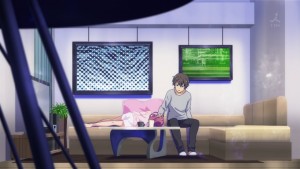


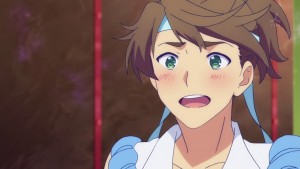
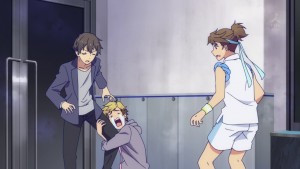
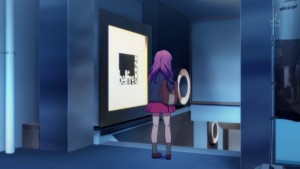

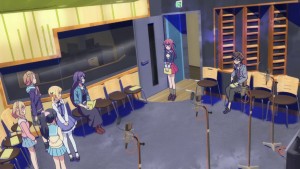





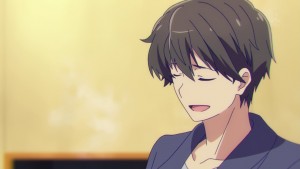



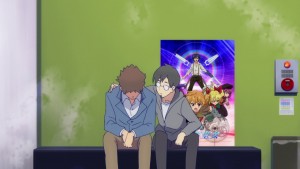
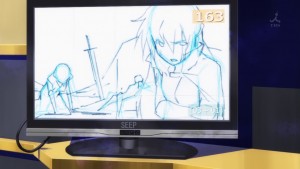




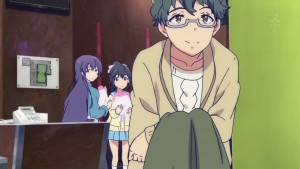
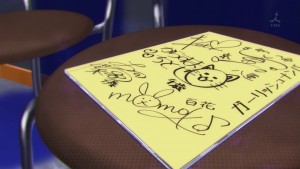





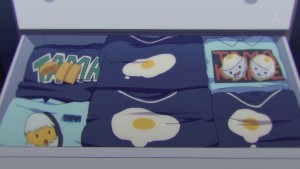
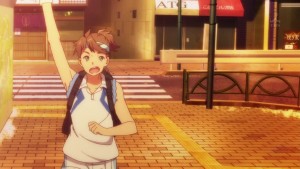






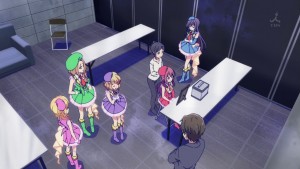






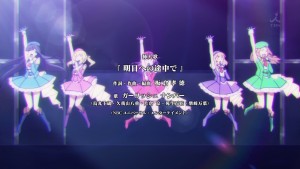



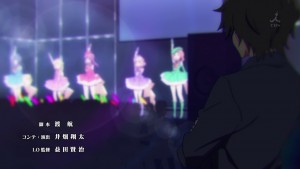






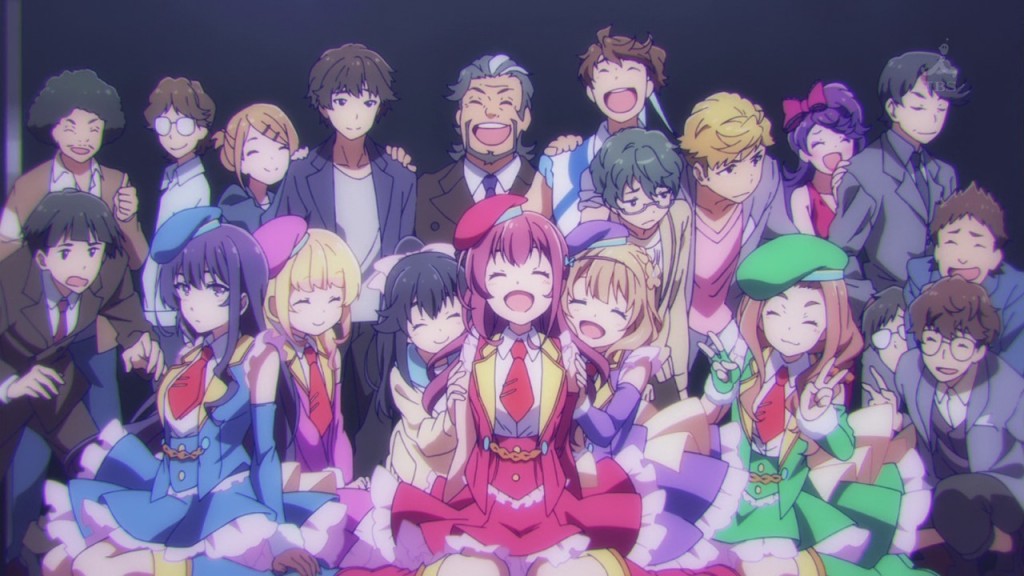


Faolin Eye
December 25, 2016 at 3:26 pm“She may not be the protagonist we want, but she’s the on we need (and deserve, ROFL).”
GAHAHA, it gave me a good laugh and this line also sums up Chitose’s character so perfectly.
In all seriousness, first of all, thanks for covering this series, Enzo! It also flew under my radar at first, and only after reading the first episode’s review over at RC and here that I gave this show a chance but in the end it became my AOTS (well, truth to be told, only by a small margin since Udon no Kuni was also a serious contender). Your coverage of the series also helped to elevate it to the ranks of my favourites since your on point analysis was always an honest look at the show’s themes and characters, while the majority of the fandom (or at least those few who actually watched this show) is “easily led by the nose”, so it’s extremely hard to find constructive criticism of the series.
As for the last episode, it was an almost perfect end combining all those elements of character and story which made the previous ones entertainig and thought-provoking while giving some closure through the ending of “KuuSure”. The ending scene with the girls at the bar was an absolutely “true to the show” finishing moment, I couldn’t even ask for a better one.
While it’s understandable that this show will hardly make the year-end top 10 list, I still hope for a place on the 11-20 list, or it would be nice to see Momoka as the best supporting actress (or maybe Chitose as the best actress) at the Oscar’s.
Benjamin Adams
December 25, 2016 at 9:57 pmFor an absolutely bleak take on the anime industry, there’s episode 10 of Paranoia Agent.
Haraga
December 26, 2016 at 7:11 amI think Yae implied that Chitose being the only one late was the result of her not having any prior recording sessions.
As a character Chitose seems to be close to the original definition of “moe” (someone you are supposed to feel protective towards), emphasized in this episode by the moment when she fell and smashed the screen of her phone.
Thank you for writing about this show, your write-ups were amazing! You probably were among the few people who did it justice.